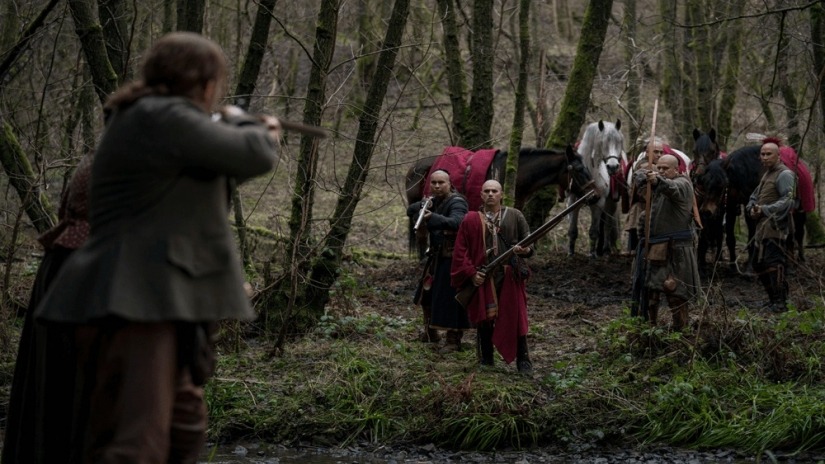This review contains spoilers.
4.5 Savages
For the second episode in a row, Outlander delved into colonial life in pre-Revolutionary War North Carolina mostly without broad strokes time travel pedantry. Savages is a slightly more successful version of the narrative Outlander attemped to gracefully tell in Do No Harm: what it looks like when people with power (Claire and Jamie) are faced with the horrific, unjust consequences of the hierarchy that gives them power. How will they use their status to change (or not change) things?
In Do No Harm, the show bent over backwards to put Claire and Jamie in the problematic role of white saviour, thinking that contorting them into that context would be enough. (It wasn’t.) In Savages, the conflict between coloniser and colonised is still all about the coloniser protagonists, but at least Claire doesn’t make any pedantic proclamations implying that her twentieth-century sensibilities automatically give her the moral high ground.
Unfortunately, in both episodes, Outlander creates a third, greater coloniser evil seemingly for the sole purpose of making Claire and Jamie seem like the good guys here. Sure, they may be white colonisers who are taking land away from indigienous people and actively supporting a regime that aims to remove the Cherokee, but they aren’t actively killing the Cherokee, right? So they can’t be that bad.
This would be a much stronger story if it recognises that Claire and Jamie are choosing their power and privilege over trying to reform the system. It’s an understandable choice. As humans, we tend to prioritise the safety of ourselves and the people we love over all else, but it is a choice nonetheless. It’s choosing a status quo that is inherently unjust, and opting into a violent system in exchange for the privilege it grants.
That being said, Savages included some lovely moments. I loved to see the interaction between Claire and Adawehi—it was the kind of more powerful, effective engagement between Claire/Jamie and the Cherokee I was hoping to see in the previous episode, and also gave us a Cherokee character rather than a somewhat amorphous group that felt more like a plot device than a gaggle of real people. (Unfortunately, Outlander soon killed that character, yet another example of a woman of colour being killed to further a white protagonist’s story.)
It was clever the way Outlander tied Brianna’s trip into the Claire/Adawehi scene, effectively killing two birds with one stone: making us believe in the bond between these two characters, and reminding us of Bree’s impending arrival. (By the end of the episode, Bree was through the stones.) It was a nice, quiet, healing moment that made the horror that was to come that much more painful.
The horror of the settlers vs. savages storyline was somewhat offset by the joy of this episode’s other major plot: The Return of Murtagh! Based simply on Claire and Jamie’s ‘ageing,’ it can be hard to remember that so much time has passed in the lives of these characters. When someone like Murtagh reappears in their life, and these actors are able to delve into the intense emotion of being reunited with a loved one you never thought you’d again see, we feel the weight of the passage of those years emotionally.
The return of Murtagh into Claire and Jamie’s lives may not be the same kind of emotional high we got when Claire and Jamie reunited last season, but it’s not nothing, either. Romance isn’t the only kind of relationship this show prioritizes. Murtagh, Claire, and Jamie were a family for a long time, and he is still one of the only people in their lives who knows the secret of Claire’s time travel. (The reminder that Young Ian does not know was a nice way to hammer home to viewers just how much Jamie and Claire have trusted Murtagh… just how much a part of their family he is.)
In the books, Murtagh is killed at the Battle of Culloden, but the show has not only chosen to keep the character alive, but to give him a much more integral role in the narrative. Personally, I’d like to see the TV show adaptation take more chances like this one, making this story their own and not only recognising that TV is a vastly different medium than novels, but that the pop culture conversation has changed a great deal since many of these books were originally published.
Read Kayti’s review of the previous episode, Common Ground, here.

